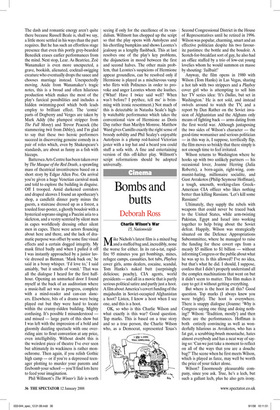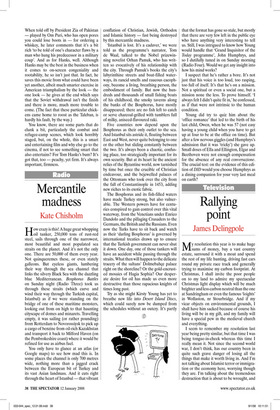Bombs and butts
Deborah Ross
Charlie WilsonŌĆÖs War 15, Nationwide
Mike NicholsŌĆÖs latest film is a mixed bag and a stuffed bag and, incredibly, none the worse for either. In its rat-a-tat, rapidfire 95 minutes you get bombings, mines, refugee camps, casualties, hot tubs, Playboy cover girls, arms dealers, cocaine, scandal, Tom HanksŌĆÖs naked butt (surprisingly delicious; peachy), CIA agents, world presidents ŌĆö and all in a movie that is partly serious political satire and partly just a hoot. A film about AmericaŌĆÖs covert funding of the mujahedin in Soviet-occupied Afghanistan a hoot? Listen, I know a hoot when I see one, and this is a hoot.
OK, so who is this Charlie Wilson and what exactly is this war? Good question. Top marks. This is based on a true story and so a true person, the Charlie Wilson who, as a Democrat, represented TexasŌĆÖs Second Congressional District in the House of Representatives until he retired in 1996. Wilson was popular, charming, smart and an effective politician despite his two favourite pastimes: the bottle and the boudoir. A Scotch-for-breakfast sort of guy, he also had an office staffed by a trio of low-cut young lovelies whom he would summon en masse by shouting: ŌĆśJailbait!ŌĆÖ Anyway, the film opens in 1980 with Wilson (Tom Hanks) in Las Vegas, sharing a hot tub with two strippers and a Playboy cover girl who is attempting to sell him her TV series idea: ŌĆśItŌĆÖs Dallas, but set in Washington.ŌĆÖ He is not sold, and instead swivels around to watch the TV, and a report by Dan Rather on the Soviet invasion of Afghanistan and the Afghans only means of fighting back ŌĆö arms dating from the first world war. Although juxtaposing the two sides of WilsonŌĆÖs character ŌĆö the good-time womaniser and serious politician ŌĆö in this way is, I suppose, terrifically flip, the film moves so briskly that there simply is not enough time to feel irritated.
Wilson returns to Washington where he hooks up with two unlikely partners ŌĆö his occasional lover, Joanne Herring (Julia Roberts), a born-again, right-wing, communist-hating, millionaire socialite, and Gust Avrakotos (Philip Seymour Hoffman), a tough, uncouth, working-class GreekŌĆō American CIA officer who likes nothing better than killing Russians. ŌĆśLetŌĆÖs kill some Russians!ŌĆÖ Ultimately, they supply the rebels with weapons that could never be traced back to the United States, while arm-twisting Pakistan, Egypt and Israel into working together to help bring about the Soviet defeat. Happily, Wilson was strategically situated on the Defence Appropriations Subcommittee, where he managed to raise the funding for these covert ops from a measly $5 million to $1 billion ŌĆö without informing Congress or the public about what he was up to. Is this allowed? IŌĆÖve no idea, but thatŌĆÖs what he did. I should, I suppose, confess that I didnŌĆÖt properly understand all the complex machinations that went on but it didnŌĆÖt seem to matter. This film makes it easy to get it without getting everything.
But where is the hoot in all this? Good question. Top marks (I always knew you were bright). The hoot is everywhere. There is snappy dialogue (Joanne: ŌĆśWhy is Congress saying one thing and doing nothing?ŌĆÖ Wilson: ŌĆśTradition, mostlyŌĆÖ) and then there are the performances. Hoffman is both entirely convincing as well as wonderfully hilarious as Avrakotos, who has a fat gut, a scrubbing-brush moustache, hates almost everybody and has a neat way of saying so: ŌĆśCan we just take a moment to reflect on all of the ways that you are a douche bag?ŌĆÖ The scene when he first meets Wilson, which is played as farce, may well be worth the price of your ticket alone.
Wilson? Enormously pleasurable company, since you ask. True, heŌĆÖs a lech, but such a gallant lech, plus he also gets irony. When told off by President Zia of Pakistan ŌĆö played by Om Puri, who has open pores you could lose boots in ŌĆö for ordering a whiskey, he later comments that itŌĆÖs a bit rich ŌĆśto be told of oneŌĆÖs character flaws by a man who hung his predecessor in a military coupŌĆÖ. And as for Hanks, well. Although Hanks may be the best in the business when it comes to on-screen congeniality and rootability, he so isnŌĆÖt just that. In fact, he saves this movie from what could have been yet another, albeit much smarter exercise in American triumphalism by the look ŌĆö the one look ŌĆö he gives at the end which says that the Soviet withdrawal isnŌĆÖt the finish and there is more, much more trouble to come. (The fact that these particular chickens came home to roost as the Taleban, is hardly his fault, by the way.) You know, there are some parts that do clunk a bit, particularly the combat and refugee-camp scenes, which look horribly staged, but, on the whole, this is a smart and entertaining film and why else go to the cinema, if not to see something smart that also entertains? For Tom HanksŌĆÖs bum? ItŌĆÖs got that, too ŌĆö peachy, yet firm. ItŌĆÖs always important, firmness.



























































 Previous page
Previous page